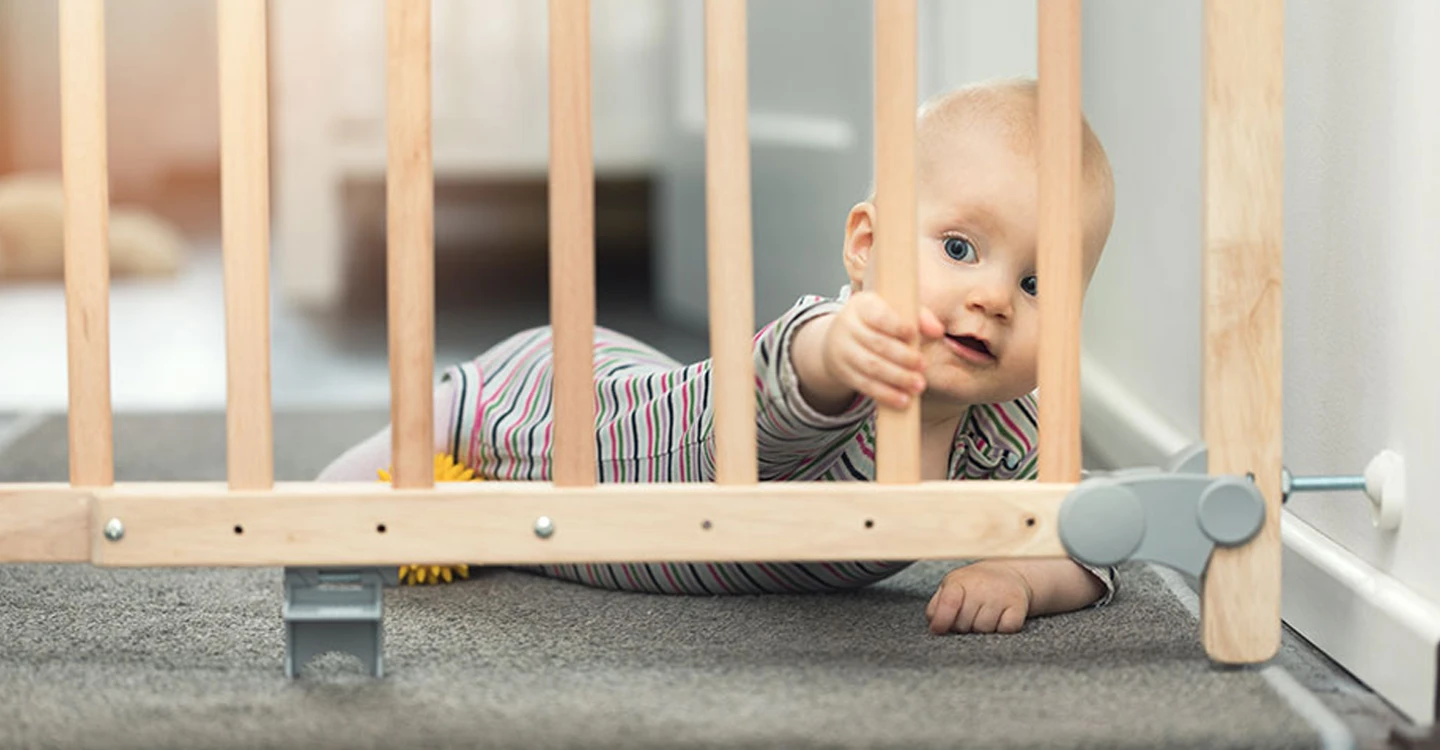You'll do anything to keep your baby out of harm's way. See how you can keep your baby safe at home, on the road and beyond.
Make Your Home a Safe Place
Not sure when to start babyproofing? The rule of thumb is to make sure your home is completely babyproofed before your little one is mobile.
“The rule of thumb is to make sure your home is completely babyproofed before your little one is mobile – usually around 4 to 6 months of age. Make sure stairs are gated and cabinet doors are locked," said Tyler Barnes, M.D., a pediatrician with Atrium Health Floyd. “I also advise making sure electrical outlets are covered and the floors are clean of any toys or other objects they could get to and put in their mouths."
Get plugs for outlets, locks for cabinets and secure heavy things that could be pulled down on your baby, like bookcases or dressers. Move chemicals and unsafe products out of reach, put gates on your stairs, and always have the number for your local poison control close by. Georgia Poison Control can be reached at 1-800-222-1222.Want to make sure you haven't missed anything? Look at your home from the eyes of an infant.
“Sometimes it is helpful to just go and lie down on the ground with your baby and look around the room," Dr. Barnes said. “There are lots of things babies can get into, even when they are so little. And remember, babies are a lot smarter than we give them credit for and are very curious about their environment, and they are always looking for things to grab and put in their mouths!
Put Your Baby in the Safest, Cleanest Hands
When you're introducing your baby to new people, the key is to make sure everyone washes their hands well – especially young kids, who tend to carry more germs. And don't let anyone who's sick or has a fever come by until they're fully well.
You might want to spend all your time loving on your newborn, but no one – not even you – should kiss your baby around their eyes, nose or mouth. You have germs before you even know you're sick that can transfer to your baby. Don't worry – you can still give your little one plenty of kisses on the forehead, tummy and toes!
Dr. Barnes also notes the benefits of breastfeeding in helping to build a newborn's immune system and as an effective way to reduce their risk of serious infections. Here's how it works: when pregnant women take vaccines that are recommended, such as the flu vaccine, they provide direct protection for mom, but also indirect protection for baby thanks to the transfer of important antibodies in breastmilk. In addition, breastfeeding has been shown to reduce risks of acute gastroenteritis (stomach flu) as well reduce risks for allergic diseases like asthma and atopic dermatitis (eczema).
How to Have a Safe Trip
You know you can't keep your baby in the safe bubble of your home forever. At some point, you'll be ready to take your newborn out to explore the world, but how soon is too soon? The answer, of course, depends entirely on what's best for you and your baby.
“I advise keeping infants out of public places until they have received their first vaccines," Dr. Barnes said. “Vaccines are very important for keeping your baby safeIf you have questions about when certain vaccines should be received, check with your pediatrician."
Whether you're taking a short drive down the road or planning a longer getaway, it's crucial to use the right size car seat for your baby's weight. Also keep in mind that rear-facing car seats are now recommended until age 2.
Tips for Preventing SIDS
Sudden infant death syndrome – or SIDS – is the unexpected, often unexplained death of a newborn. As you can imagine, it's a big concern for parents, especially when their baby is sleeping because that's when SIDS usually occurs.
Always make sure to put baby down on their backs to sleep and keep any toys, pillows or large blankets out of the crib/bassinet.
Babies should always sleep in a crib or bassinet by themselves. Never sleep in the same bed with your baby. It is a safety issue because babies can suffocate. It is also an issue as the baby gets older because then you have the unfortunate task of trying to transition the baby back to their own crib or bed at that time.
Playing It Safe
There are certain products out there that might be popular – but aren't particularly safe. Here are Dr. Barnes' thoughts on a few of those products:
Baby bumpers: They are not recommended for newborns. However, they are safe to use once babies are older and can roll both ways or crawl, as long as they are the mesh pads.
Teething rings/necklaces: Can be a choking hazard.
Heart monitors: Cause undue stress to parents. Avoid these unless your baby has a congenital heart or lung problem and is supposed to use one as directed by a pediatric cardiologist or pulmonologist.
When it comes to keeping your baby safe, you probably have lots of questions – don't be afraid to ask them. “No question is a silly question for your provider, especially when it comes to babies," says Dr. Barnes. “We welcome all kinds of questions, especially for new parents and families."
